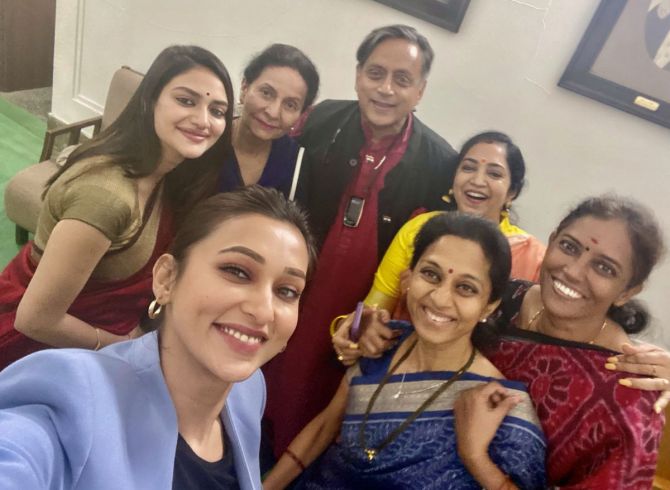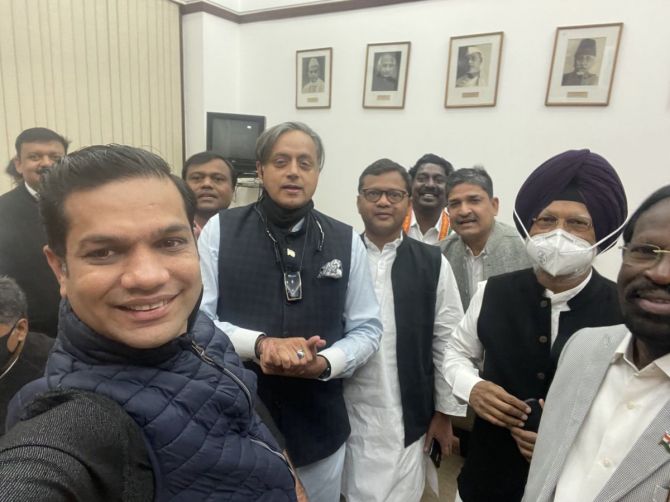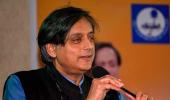Will Indian democracy benefit from the potential that Shashi Tharoor stores in his mind, spirit and intellect?
Or will it be the saga of another leader who promised much but delivered too little, asks Sudhir Bisht.

Dr Shashi Tharoor is one of the most complex persons to understand in India's political landscape.
He is held in high respect by the intellectual class among Indians who swear by his articulation of his original and sometimes bold thoughts.
He is equally trolled for his controversy-seeking tweets and for his easy acceptance of the insignificance in his party that is ruled by those whose only claim to fame is their powerful surname.
Tharoor is the author of An Era in Darkness: The British Empire in India for which the Sahitya Akademi award was bestowed upon him in 2019. The book made him a darling of many Indians who wanted the international community and especially the current generation of Englishmen to know how the British empire systematically looted India.
All Indians who feel ashamed at their history and are never tired of thanking the British empire for everything that it did to safeguard its own interests should read the book.
Tharoor's book scientifically proves that modern England is built upon the treasure that came from systematic transfer of wealth from India to Britain over a period of 173 years that ended in 1947.
The railways that the British built in India were built at an astronomical cost and it helped the British contractors and the British army many times more than it helped Indian railway workers and its travellers.
The 350-page bestseller has done a huge service to the children born post the baby boomers generation.
Generation X (born between 1965 and 1980), the Millennial generation (born between 1981 and 1996) and Gen Z (born 1997 and 2012) is forever in a sense of awe of whatever has been achieved by European nations.
Many of them are in admiration of the liberal values that the western world claims to stand for.
Tharoor's book helps in removing the cloak of pseudo humaneness that the Western world seems to be wearing since time immemorial.
The rich OECD nations flaunt their likeness for the Environmental, Social and Governance, or the ESG factors, but the children of these nations would be shocked and anguished if they read Tharoor's book or listened to the numerous speeches he has given all over the world
Tharoor describes in vivid detail how our former rulers destroyed local cropping patterns and forced our farmers to grow indigo in place of the traditional crops.
The British introduced the education system propounded by Thomas Babington Macaulay that sought to create a social class in India that was 'Indian in blood and colour but English in taste'. They wanted education in India to be an organ that produced English-speaking interpreters.
Tharoor also talks about the rampant corruption in the British empire that resulted in the transfer of more than $45 trillion from India to Britain in the 173 years of occupation of India.
Tharoor is the hero for all Indians who feel a sense of pride in owning up India as a great civilisation. His speeches and writings also give immense satisfaction to Indians who believe that the history of India is not limited to the India that existed upwards of Vindhyachal. He speaks about the maritime competency of southern India during the 11th and 12 century CE
In short, Tharoor is that charming Indian thought-leader who can be celebrated with pride at Times Square in New York or at Trafalgar Square in London. He is the poster boy of India that seeks to present itself as a nation of educated citizens, not in awe of people with white skin.
Then there is another Shashi Tharoor.
The one who is so much derided for his lack of civility and empathy. It amazes me that a man who has spent three decades in international affairs appears to be in some kind of a crisis on social media.
He once sullied his reputation for being an articulate communicator by calling the economy class passengers of airlines as cattle class. This created an uproar and he kept maintaining the point of view that 'cattle class' referred to the cheapest class of seats of an aircraft and he did not mean to offend the passengers of economy class by calling them goats, cows and buffaloes.
However, the damage had been done. As a first-time MP in 2009, he chose to stay at the 5- star hotel (Taj Man Singh) instead of the usual accommodation that is provided for members of Parliament. Since then he has forever been labelled as an elitist.
His reason for preferring an expensive hotel? He said he could not stay at a hostel that did not have a first class functional gym!
How many MPs or political personalities can be so fortright in claiming that their physical well-being takes precedence over their image of being a representative of the hoi polloi?

Shashi Tharoor had also been in the news for his involvement in the award of the IPL franchisee to the Kochi Tuskers.
In 2010, when Tharoor was minister of state for external affairs, a little known group had won a bid for more than $330 million to bring an IPL team to Kochi.
It was alleged that the group had given sweat equity worth one-fourth of the franchise holding to another group that included Tharoor's girlfriend (later his wife).
While the controversy died after Tharoor quit as minister in April 2010, it sullied his image badly. It appears that Tharoor was guilty of perceived conflict of interest, if not of actual conflict of interest.
Tharoor's academic record is something that can make anyone envious. He schooled at St Xavier's in Kolkata, graduated from the best college in India, St Stephen's, and went on to study at Tufts University in the USA for a masters in law and diplomacy. He topped it with a doctoral degree in international relations and affairs.
Tharoor has achieved significant milestones in his professional career. He joined the United Nations as a staff member of the UN high commissioner for refugees in 1978 and in a span of little over two decades rose to the position of UN under secretary-general. This is the highest position in the UN that a career professional can aspire to achieve.
The highest leadership position at the UN is the secretary-general's and it is an elected position. Tharoor made a strong bid for the position in 2007, but lost to then South Korean foreign minister Ban Ki- Moon in the informal straw polls conducted by the UN Security Council. His candidature was frustrated by the United States's veto vote and he withdrew from the race.
Tharoor has been a member of the Lok Sabha since 2009. He has represented Thiruvananthapuram constituency, winning three successive elections on his own steam.
What is surprising is that Tharoor appears content playing second fiddle to the uninspiring leadership of the Congress party.
His lack of ambition is surprising. He is a great communicator, a three-time MP who does not need his party's support to win elections and most importantly, he is one of the few South Indian politicians who speaks excellent Hindi. Why does Tharoor not consider himself an aspirant for the top leadership position in his party?
He does not owe his rise in the party to the Nehru-Gandhi family's munificence. It may be so in respect of Manish Tiwari, Ghulam Nabi Azad, Kapil Sibal or Anand Sharma, but Tharoor is a powerhouse in his own right.
His Twitter account has 8.1 million followers that compares favourably with Rahul Gandhi's 19.5 million followers, given the fact that the latter had been de facto president of the Indian National Congress since 2014.
Priyanka Gandhi, the Congress general secretary who comes 3rd in the party's power list after her mother Sonia and brother Rahul, has just 4.2 million followers.
Tharoor was also in the news this week for posting a selfie with six women parliamentarians. In the tweet, he says, 'Who says the Lok Sabha isn't an attractive place to work? With six of my fellow MPs this morning: @supriya_sule @preneet_kaur @ThamizhachiTh @mimichakraborty @nusratchirps @JothimaniMP'
A flurry of responses followed that told him that by labelling the women parliamentarians as 'attractive' Tharoor was 'objectifying' women.
National Commission for Women Chairperson Rekha Sharma tweeted, 'You are demeaning their contribution in Parliament and politics by make them an object of attraction. Stop objectifying women in Parliament.'
Tharoor then tweeted a selfie of himself with male parliamentarians and tweeted: 'More comradeship in Parliament as MPs assemble this morning, but no one expects these to go viral. Though I am an equal-opportunity offender!'
Who, then, is the real Dr Shashi Tharoor?
A former brilliant UN official who got embroiled in the IPL controversy and used all his international negotiation skills to come out unscathed?
Or is he the leader who inspires Indians to draw self-confidence from the rich achievements of the Chola Empire but himself falls short when it comes to challenging the mediocre -- some say less than mediocre -- leadership of a party that was once formidable as well as glorious?
Is Tharoor the intrepid slayer of the formidable reputation of the powerful British empire? Or is he just a selfie-loving alpha male who needs to keep uplifting his ageing profile by posting selfies with 'attractive' women colleagues?
Will Indian democracy benefit from the potential that Tharoor stores in his mind, spirit and intellect?
Or will it be the saga of another leader who promised much but delivered too little?
Will the real Shashi Tharoor stand up, please?
Sudhir Bisht, PhD, author and columnist, writes from New Delhi.












 © 2025
© 2025